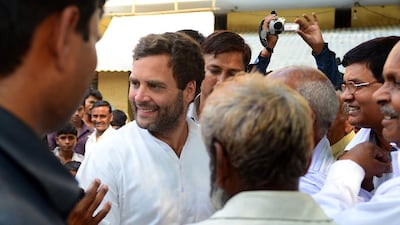NEW DELHI // Himat Bahadur Singh recalls when the late prime minister Rajiv Gandhi promised his village a bridge that would allow easy access to a community on the other side of the river. Thirty years later, he is still waiting.
“There’s a limit to our patience,” said Mr Singh, 70, while watching a wooden boat ferry passengers across the Sai River in Amethi, a parliamentary constituency that has been represented by Gandhi family members and a loyalist for all but one year since 1980. “It gives us pain and anger thinking that Rahul Gandhi is unable to fulfill the promises his father made to us.”
Rahul Gandhi, 43, is seeking re-election in Amethi, which went to the polls on Tuesday in the eighth of nine rounds of voting in the general election ending on May 16. His family has produced three prime ministers, including his great-grandfather, grandmother and father.
While Mr Gandhi’s ruling Congress party channelled subsidies into India’s rural regions and sought to aid the poor with work guarantees, disenchantment mounted with corruption cases and a tumble in the nation’s growth rate. Narendra Modi and his Bharatiya Janata Party are capitalising on the discontent by showcasing the relative economic success of his state, Gujarat.
“The traditional constituents of the Congress party have become ambitious,” said Shiv Visvanathan, a professor at the Jindal School of Government and Public Policy in Haryana state bordering Delhi. “They want delivery, not just promises. They feel they have been cheated and want to punish Congress.”
Opinion polls show the Congress party heading for its worst-ever defeat in elections dating back to 1947, when Jawaharlal Nehru, Rahul Gandhi’s great-grandfather, became India’s first prime minister after independence. Indira Gandhi, his grandmother, led the country for more than 15 years before her assassination in 1984.
The Amethi seat – one of 80 in Uttar Pradesh, India’s most populous state – has been held previously by Sanjay Gandhi, Rahul’s uncle, and both of Rahul Gandhi’s parents: Rajiv Gandhi until his assassination in 1991 and Sonia Gandhi from 1999 to 2004. Rahul took over afterward, and in 2009 won re-election by a margin of about 370,000 votes.
His rivals are pushing to make it a close race this time, citing pot-holed roads, a sporadic electricity supply, lack of a good hospital and closed factories as evidence of mismanagement under the Gandhis. Both Mr Modi and Arvind Kejriwal, leader of the upstart anti-corruption Aam Aadmi Party, have campaigned in Amethi in the past week and blasted the family for the poor state of development.
“They are running the government for the last 10 years, but they couldn’t develop Amethi,” Mr Kejriwal told a rally in the constituency on May 1. “If Rahul Gandhi loses elections here, not only Amethi, but the whole country will be freed from the Gandhi family.”
Mr Modi, campaigning in Amethi two days before voting, contrasted its lack of development with economic gains in Gujarat, the state he has run since 2001, which has outpaced the national economic growth rate in 11 of the past 12 financial years for which data is available. He blasted Rahul Gandhi for a lack of toilets in Amethi’s schools.
“They go all over the nation and abuse the Gujarat model – do they have the courage to ask what is happening in Amethi?” Mr Modi said, referring to the Gandhi family. “In the name of the poor they are looting the nation.”
Rahul Gandhi, who visited Amethi on Tuesday, has dismissed the attacks. He said his party had improved schools and hospitals in the area, and blamed the state government and legal issues for the poor road conditions and lack of a 24-hour electricity supply.
“I came here at the age of 12 with my father,” he told a crowd of about 5,000 people in the constituency on Saturday. “I don’t have a political relationship with this place – it’s an old family relationship.”
Priyanka Gandhi Vadra, Rahul’s sister, has also invoked her family’s bond with the people of Amethi while walking through crowded marketplaces and meeting women’s groups.
“He thinks he is working to fulfill the unfinished dreams of his father,” Mrs Vadra said last week.
For some in Amethi, those emotional appeals are enough to win their votes.
“Whatever Amethi has achieved is because of the Gandhi family, and whatever identity Amethi has is also because of them,” said Ganesh Mohalla, a 65-year-old shopkeeper in the constituency.
Others like Bhanu Kumar Vishwakarama, 43, point to abandoned paper, fibre and steel factories in Amethi as a reason to vote against the Gandhis.
“Our fortunes stopped shining the day when Rajiv Gandhi was assassinated,” Mr Vishwakarama said. “Rahul proved he can’t deliver.”
Mr Singh, who was present in Sitkhiya village with 2,000 others in 1984 when Rajiv Gandhi pledged to build the bridge, said he would to vote against Congress for the first time in three decades. Sudhir Kumar, from a neighbouring village along the river, agreed.
“Building this bridge will not cost much – only due to a lack of sincerity it’s not happening,” Mr Kumar said.
“I don’t know when and by whom it will be constructed, but our votes aren’t going to Congress.”
* Bloomberg News

